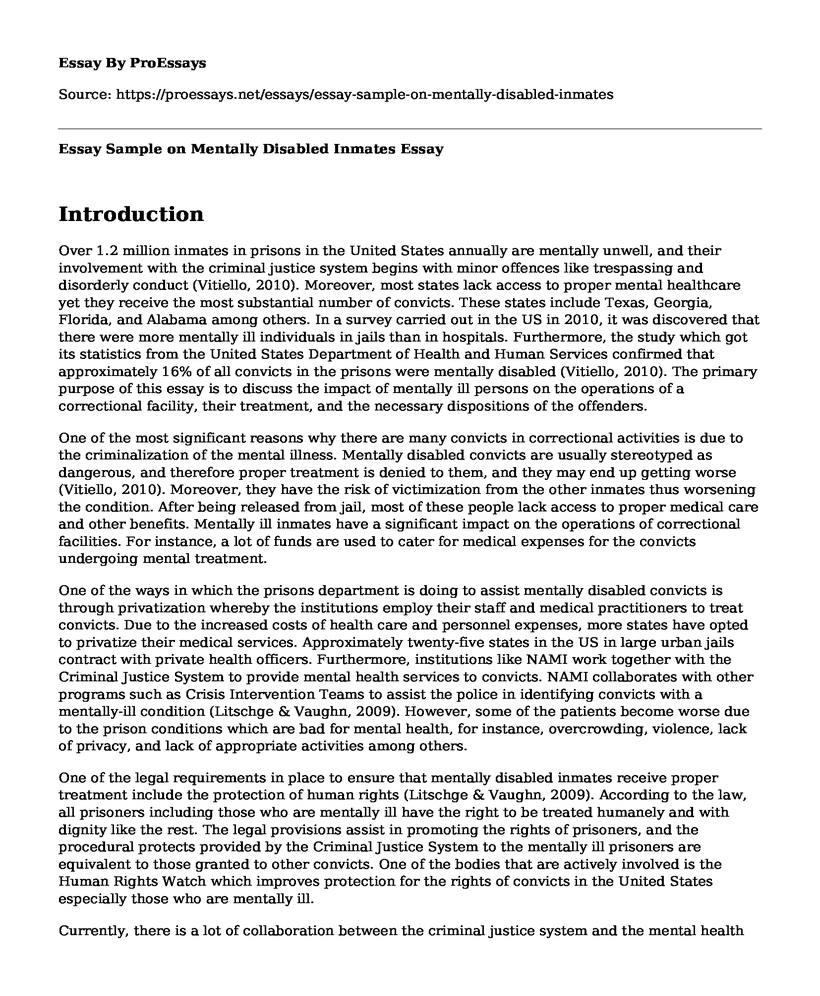Introduction
Over 1.2 million inmates in prisons in the United States annually are mentally unwell, and their involvement with the criminal justice system begins with minor offences like trespassing and disorderly conduct (Vitiello, 2010). Moreover, most states lack access to proper mental healthcare yet they receive the most substantial number of convicts. These states include Texas, Georgia, Florida, and Alabama among others. In a survey carried out in the US in 2010, it was discovered that there were more mentally ill individuals in jails than in hospitals. Furthermore, the study which got its statistics from the United States Department of Health and Human Services confirmed that approximately 16% of all convicts in the prisons were mentally disabled (Vitiello, 2010). The primary purpose of this essay is to discuss the impact of mentally ill persons on the operations of a correctional facility, their treatment, and the necessary dispositions of the offenders.
One of the most significant reasons why there are many convicts in correctional activities is due to the criminalization of the mental illness. Mentally disabled convicts are usually stereotyped as dangerous, and therefore proper treatment is denied to them, and they may end up getting worse (Vitiello, 2010). Moreover, they have the risk of victimization from the other inmates thus worsening the condition. After being released from jail, most of these people lack access to proper medical care and other benefits. Mentally ill inmates have a significant impact on the operations of correctional facilities. For instance, a lot of funds are used to cater for medical expenses for the convicts undergoing mental treatment.
One of the ways in which the prisons department is doing to assist mentally disabled convicts is through privatization whereby the institutions employ their staff and medical practitioners to treat convicts. Due to the increased costs of health care and personnel expenses, more states have opted to privatize their medical services. Approximately twenty-five states in the US in large urban jails contract with private health officers. Furthermore, institutions like NAMI work together with the Criminal Justice System to provide mental health services to convicts. NAMI collaborates with other programs such as Crisis Intervention Teams to assist the police in identifying convicts with a mentally-ill condition (Litschge & Vaughn, 2009). However, some of the patients become worse due to the prison conditions which are bad for mental health, for instance, overcrowding, violence, lack of privacy, and lack of appropriate activities among others.
One of the legal requirements in place to ensure that mentally disabled inmates receive proper treatment include the protection of human rights (Litschge & Vaughn, 2009). According to the law, all prisoners including those who are mentally ill have the right to be treated humanely and with dignity like the rest. The legal provisions assist in promoting the rights of prisoners, and the procedural protects provided by the Criminal Justice System to the mentally ill prisoners are equivalent to those granted to other convicts. One of the bodies that are actively involved is the Human Rights Watch which improves protection for the rights of convicts in the United States especially those who are mentally ill.
Currently, there is a lot of collaboration between the criminal justice system and the mental health system. Most of the patients are pre-hospitalized before standing their trials after which they are returned to the court for their final disposition. Evaluations are then done to evaluate the candidates competent enough to stand a second trial (Litschge & Vaughn, 2009). Most charges are dropped especially for incompetent students after taking their competency examinations.
Conclusion
High percentage of convicts in the United States is mentally ill, and it is the responsibility of the criminal justice system to ensure that the individuals receive proper health care. Those with severe cases should be admitted to hospitals while the rest remain in prison but with special attention. The World Health Organization through the bill of rights demands that all convicts' rights must be protected as required by the constitution of the United States.
References
Litschge, C. M., & Vaughn, M. G. (2009). The Mentally Ill Offender Treatment and Crime Reduction Act of 2004: problems and prospects. Journal of Forensic Psychiatry & Psychology, 20(4), 542-558. doi:10.1080/14789940802434675
Vitiello, M. (2010). Addressing the Special Problems of Mentally Ill Prisoners: A Small Piece of the Solution to Our Nation's Prison Crisis. Denv. UL Rev., 88, 57.
Cite this page
Essay Sample on Mentally Disabled Inmates. (2022, Oct 12). Retrieved from https://proessays.net/essays/essay-sample-on-mentally-disabled-inmates
If you are the original author of this essay and no longer wish to have it published on the ProEssays website, please click below to request its removal:
- Law Essay Sample: A Successful Insanity Defense in the US
- Social Work Practice and Health Care Access Among Hispanic Immigrants
- Informed Consent for Mentally Incapacitated Patients
- Beauty Sleep: Health and Attractiveness of Sleep Deprived People Paper Example
- Essay Example on Childhood Obesity in Alabama: A Community Health Assessment
- Ebola Virus Disease - Deadly Acute Illness Since 1976 - Research Paper
- Essay Example on Mary Eliza: A Trailblazing Black Professional Nurse







